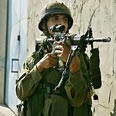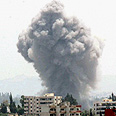
IDF-Hizbullah battle
Photo: AP

Fire in Lebanon
Photo: Reuters
The level of intelligence information the IDF collected about Hizbullah in recent years has been very poor. One could even say pathetic.
I mean information that deals with the types of weaponry the enemy has at its disposal, their communications systems, the size and location of their positions – exactly, not approximately – their depth, how they are camouflaged, and dozens of other small and large details about the enemy.
I don't mean strategic information. I mean basic intelligence about enemy targets, the elementary information necessary for any military operation; stuff that was right under their noses.
Previous Commentary
Alex Fishman
What happens when the ground campaign achieves its goals, but Hizbullah is still standing?
These details make intelligence believable. They provide a strong base from which to go out to battle. Good intelligence is a critical element of any battle plan.
Too many surprises
But there have been too many surprises waiting for our troops, starting with the kidnapping of two soldiers two weeks ago, continuing with the Maglan and Egoz units getting entangled. And the ground war has only just begun.
For six years we sat across the border from them. We can blame half the world; we can claim that the politicians didn't really deal with the Hizbullah problem; that they didn't respond appropriately to Hizbullah's belligerence. Former and current officers can repeat their charges that defense ministers and prime ministers fell asleep at the proverbial wheel.
But these claims have nothing to do with the Northern Command's responsibility to gather intelligence, to build high-quality target files and to minimize the number of surprises waiting for our troops.
Hats off to the IDF
It is for that very reason that we must take off our hats to the IDF operations team – tacticians and ground forces – operating today in south Lebanon. This is where Israel's advantage in quality manpower at all senior levels finds expression.
Brigade, battalion and company commanders have had to quickly switch from fighting terrorists in the territories to fighting highly trained guerillas in Lebanon, while also dealing with serious lacks in intelligence.
It's no small matter. Gathering tactical intelligence must be done during battle. This has been the true test of our ability for years.
The public, too, managed to make this quick change. In a matter of hours, it moved from peace time to a war footing. This, too, is no small matter. Very few societies could make that switch so quickly.
And today – rightly, perhaps – the public doesn't really understand the ground war, and feels that something isn't quite right. Things are just going too slow, the army is too limited, there are too many accidents. Things are supposed to look different.
Tough blows
True, we took some tough blows the first two days of the ground war. But there is a good chance that the faster the army adapts to this type of fighting, things will begin to improve.
Poor intelligence is not a fatal blow. It is a matter of priorities. Israel has estimated that the biggest threat came from long-range missiles. And on the first and second days of fighting, the air force hit, with great precision, dozens of targets deep in Lebanon that hid long-term rockets.
Israel's intelligence left Hizbullah feeling stunned and exposed. Israel spent years gathering intelligence about the rocket batteries, and it paid off during that first strike.
On the other hand, it appears that the army is stuck in a doctrine set by politicians that Israel will never return to Lebanon. It neglected intelligence gathering about lesser threats like short-range Katushyas and the lone soldier with an anti-tank missile launcher on his shoulder.
This gap in intelligence also hints that the current war was not exactly planned. Perhaps because of this, there is a difficulty, to this very day, to precisely define the war's political goals.
Hizbullah ethos
The ground war going on in south Lebanon today is another attempt by the IDF to throw the enemy off balance in preparation for a political agreement along the northern border. Therefore, the goals are not to capture territory, but rather to physically strike Hizbullah's assets and symbols.
'Hitting assets' means killing or taking prisoner as many Hizbullah soldiers as possible. 'Hitting symbols' means breaking the ethos of a Hizbullah warrior, an ethos that we contributed more than a bit to creating.
Therefore, central operative idea is to move forward, all the time. Every day brings the IDF to a new town, a new place. Not to get bogged down in one place. Not to spend days fighting the enemy for one outpost, only to find the enemy is still standing at the end.
An additional motto of the ground war: Slowly, carefully, with a minimum of casualties. We have at least another week of fighting ahead. There is no reason to rush, because there is no list of targets the army is moving to capture.
We must get to the villages and the open areas where Hizbullah is and hit their people. At the same time the IDF is using a great deal of psychological warfare on the villages and on Hizbullah members themselves.
Amongst other things, the army is calling on Hizbullah fighters to lay down their weapons and to go home quietly. This, too, is part of the attempt to break the ethos. If, at the end of the day, there are not a lot of dead – or POW - Hizbullah soldiers, we will have a real problem.















